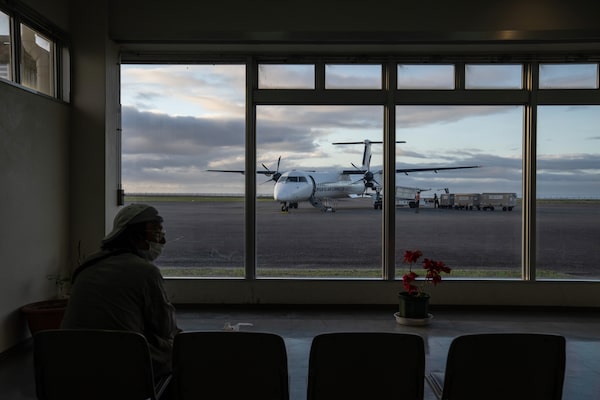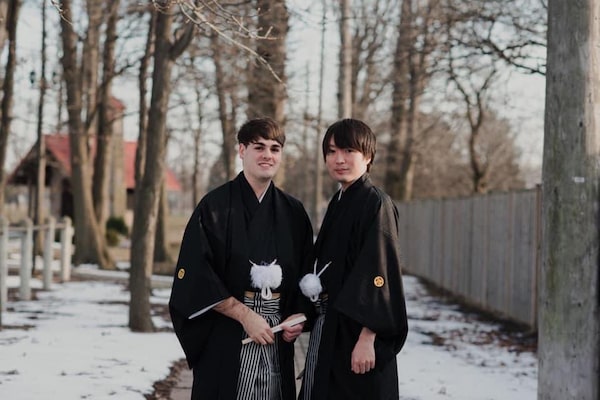
A man wearing a face mask waits to board a plane at Yonaguni Airport in Japan on April 13.Carl Court/Getty Images
During video calls from Tokyo, where Alexandre Valiquette lives with his wife and children, his three-year-old son calls Francine Grift “nana,” while his younger son, at seven months, just gurgles and smiles on screen.
Listening to that gurgling through a speaker is the closest Ms. Grift, who is Mr. Valiquette’s mother, has ever come to meeting her youngest grandchild. She lives in Saint John, and the extended family hasn’t been physically together since before the pandemic. The screen of a phone now seems to Mr. Valiquette like a barrier that can’t be crossed. “There’s that constant feeling of knowing that a touch is impossible,” he said.
The reason for this long separation, and many others like it, is that Japan is one of fewer than a dozen countries that have remained closed to foreign tourists since the start of the pandemic. It shut its borders in 2020 and has only intermittently reopened them for people visiting the country for non-tourism reasons, like business or study – most recently in March.
Until recently, there were no exceptions for family members of Japanese residents, meaning Ms. Grift was unable to visit. She saw a glimmer of hope when the Japanese government announced a new travel visa in February that would allow family to fly into the country as early as April. But getting the visa requires complicated supporting documentation, such as a letter from a guarantor and a full itinerary. And applications can only be submitted in person, at Japanese embassies and consulates.
As a result, it remains nearly impossible for most Canadians to travel to Japan. Ms. Grift gave up on her plans to do so after she realized that the consulate nearest her home is in Montreal, more than eight and a half hours away by car. Flying there would cost her hundreds of dollars.
“I just felt like crying,” she said.
Even those who are able to enter the country are still subject to strict requirements, including mandatory quarantine.
Mr. Valiquette, who works for Square Enix, a video game company, has been living in Japan for the past 10 years and has permanent residency there. But even that, he said, has been made tenuous by pandemic restrictions.

Francine Grift poses for a photo with her son, Alexandre Valiquette and his then five-month-old son in 2019.
If a Japanese citizen is caught violating quarantine or testing requirements, even accidentally, the potential penalties include fines and having their personal information disclosed publicly. Foreign nationals with permanent residency, like Mr. Valiquette, can be stripped of their immigration status and even deported.
Mr. Valiquette said he was considering flying his entire family to Canada last month, but decided not to do so because he feared the Japanese government would tighten the entry requirements without warning. If that were to happen while he was away, he would be unable to return – separated from his livelihood, wife and children.
“On a whim, Japan almost seems ready to cut off any sort of aid to their immigrant population,” he said. “Being kicked out seems like it’s way more on the table here.”
Ms. Grift said Mr. Valiquette and his family will fly to New Brunswick in August if there are no changes to Japan’s travel rules. But she’s not holding out much hope.
“They just don’t care,” she said of the Japanese government.
There are about 5,410 Canadians living in Japan who have registered with the Registration of Canadians Abroad service, Global Affairs Canada wrote in an e-mailed statement. The true number of Canadians in the country is likely larger, because registration is voluntary. Many are living there on student visas or 12-month working holiday visas.
Matthew Fukushima, a PhD student at Toyo University in Tokyo who is in Japan on a student visa, hasn’t seen his family in Windsor, Ont., in two years.
Mr. Fukushima has a Japanese husband, Daigo. But same-sex marriages aren’t recognized by Japan’s government, meaning there were no special exemptions available for Mr. Fukushima’s family members despite Daigo’s Japanese citizenship.
The Japanese government began readmitting students into the country on April 1, but Mr. Fukushima said he still has concerns, because changes at the border can be sudden.

Matthew Fukushima and his husband, Daigo, in Windsor, Ont., in February, 2020.
Japan initially announced in February that it would begin letting students back in on March 1. Upon hearing the news, Mr. Fukushima bought a plane ticket so he could visit home in December. Within weeks, the Japanese government walked back the readmission policy as it worked to curb the spread of the Omicron variant.
Mr. Fukushima said he is relieved that his family can finally come visit him in Japan as a result of the new travel visa.
“I don’t think that they will apply to come immediately, but it is good to know that they would be able to come if, knock on wood, something happened to me and they needed to be here,” he said. He isn’t planning on leaving the country any time soon.
“I am worried that they will ban us again while I am out of the country,” he said.
In the meantime, Mr. Fukushima does his best to start or end each day by talking to his parents on the phone. But the 13-hour time difference makes the calls difficult to schedule.
Last year, his mother was diagnosed with severe liver disease. He began making her cheese potato recipe whenever he felt homesick. His mother has since recovered, but he said it was hard to be away during her illness.
“I am relieved that I can see them now if necessary, but still upset that I am unable to go see them easily,” he said. “I also feel pretty angry at the government still for banning all foreign residents at the beginning – including permanent residents.”
Editor’s note: An earlier version of this article incorrectly stated that Japan's government had only recently allowed permanent residents to re-enter the country. In fact, it lifted those restrictions in 2020. Also, Japan's consulate in Montreal was incorrectly identified as an embassy.
Our Morning Update and Evening Update newsletters are written by Globe editors, giving you a concise summary of the day’s most important headlines. Sign up today.